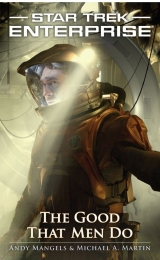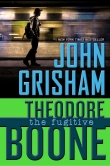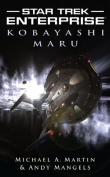
Текст книги "The Good That Men Do"
Автор книги: Andy Mangels
Соавторы: Michael Martin
Жанр:
Научная фантастика
сообщить о нарушении
Текущая страница: 24 (всего у книги 24 страниц)
With a weary sigh, Valdore reached across his desk and thumbed a control toggle, which caused the battered and charred remains of Coridan to vanish abruptly. Touching a button beside the toggle, he said, “Valdore to Nijil.”
“Nijil here, Admiral.”The chief technologist’s voice sounded logy and rough‑edged. Since Valdore knew that the abstemious scientist had never acquired the habit of drinking to excess, he chose to regard that as a good sign: Nijil also understood that war loomed near, and was therefore pushing himself as close to exhaustion as he dared in order to steer the inevitable conflict toward its most favorable possible outcome.
“Nijil, how is development progressing on the new generation of weaponry?” Valdore asked.
“So far, Admiral, all the development and testing have progressed exactly according to the Senate‑approved schedules.”
“Very good, Nijil. But it’s not quite good enough. I need you to expedite the project….”
After dismissing the harried engineer, Valdore considered the practicalities yet again. All previous attempts to create a practical invisibility cloak for the concealment of large, manned vessels had always resulted in the test ship’s destruction after a few brief siure.Despite the many failed trials he had authorized over the years, Valdore remained convinced that such a device could be the key to Romulan military supremacy.
They cannot fight what they cannot see,he thought, smiling a predator’s smile.
Fifty‑Two
Friday, March 21, 2155
Deep space
CHARLES TUCKER LEANED AGAINST the thick transparent aluminum observation port, watching as the ship’s warp field distorted the shapes and colors of the stars beyond far more slowly than seemed right. The private Rigelian passenger transport was by no means new, but Trip could at least be thankful that it wasn’t so ancient that it had to stay below warp three to keep from blowing itself up. Still, he found it difficult to get used to traveling across so many light‑years at such a leisurely pace.
He also found it hard to prevent that impatience from showing, though he knew that he needed to keep that emotion reined in–along with all the rest of his emotions, for that matter–for however many weeks or months remained in this voyage. He still appeared to be a Vulcan, and would pose as a kevas and trillium merchant from that world for the duration of his passage out to the galactic hinterlands, from which he planned to take a prearranged yet discreet ride on an Adigeon freighter back into Romulan space.
Once there, he would begin his next assignment on behalf of Section 31, the Coalition of Planets, and the people of the planet Earth.
And the great state of Florida,he thought, trying to picture the faces of his parents and his brother. He was dismayed at how difficult it was for him to imagine those faces smiling, rather than contorted with grief.
Tired of viewing the gently shifting starfield, and just as tired of the distinctly unfriendly stink‑eye he was receiving from the towering, fanged purser who apparently didn’t much like passengers getting handprints on his tidy observation ports, Trip began walking through one of the narrow guest corridors toward his modest stateroom.
Once the door was securely shut behind him, he kicked off his boots, then carried them to a small closet, where he stowed them neatly. He would have preferred either canvas deck shoes–which would have been conspicuously out of place on a Vulcan, even way out in the middle of nowhere–or at least something that felt more like real leather than his boots did. Unfortunately, he had to content himself with footwear made from vegetable fiber in order to continue passing himself off as a Vulcan, who were all essentially against the killing of animals, either for food or for apparel.
Trip stepped back to the stateroom’s desk, where he had left a small data padd beside the sample case that contained the gemstones that were part of his merchant cover‑identity. Raising the padd, he inserted the encryption‑protected data rod. He’d been carrying the rod since shortly after he’d recovered consciousness in a stolen Ejhoi Ormiinscout ship moving at high warp through Coalition space, very close to regions claimed by the Romulan Star Empire. He had already lost count of the number of times he’d played the rod’s message–a message that had clearly been recorded in haste while Trip had been lying insensate on the cockpit’s deck plates.
He keyed the start command, and the lined and surprisingly kindly‑looking face of Doctor Ehrehin–partially obscured by the environmental suit helmet he’d been wearing at the time–appeared yet again on the padd’s small display.
“I hope you will have the opportunity to view this message in safety, Cunaehr.” The old man closed his eyes, pausing momentarily as though about to correct his small name gaffe. Then he went on, perhaps in deference to Trip’s undercover anonymity.
“I truly regret the necessity of having to render you unconscious, my young friend. However, I needed to drop this vessel out of warp–but only long enough to exit in an escape pod that I will aim toward the four Romulan military vessels that still pursue us. I’ve programmed the helm to return the engines automatically to maximum warp once my pod has departed. My hope is that Valdore’s ships will fail to catch up with you, or perhaps even give up the pursuit once their crews realize that they’ve recovered me, which was their primary objective anyway.”
As on each previous occasion when Trip had listened to Ehrehin’s unexpectedly candid words, he marveled at the old man’s courage, which actually bordered on the foolhardy. After all, Valdore’s forces might well have caught up to the fleeing scout ship without destroying it, even after Ehrehin had returned to them. Had that happened, they probably would have found the scientist’s recorded message, which surely would have damned him as a traitor. Ehrehin couldn’t have believed himself so indispensable to his Empire’s war machine that he could have avoided imprisonment–or even outright execution–as a consequence. Trip could only wonder if the scientist had embedded programming inside the message designed to erase it should the wrong parties try to view it, perhaps by using the scout vessel’s internal sensors to warn the shipboard computer of the presence of other Romulan personnel.
Trip continued staring at the padd as old man continued: “As you’ve no doubt guessed already, I must decline your invitation to live among your people. I ama Romulan, after all, and I am loyal to the traditions that have always made our civilization great, going back to the time of the Sundering. But because I am an ethical student of science, I also deplore the reflexive militarism that has lately corrupted the Empire to the point that it would allow a Praetor to attempt planetary genocide. So while I will return to my people, I cannot in good conscience complete my work on the avaihh lli vastamengine, which I now know our Praetor would put to the meanest, basest imaginable use. Your words, as much as the disaster I visualize befalling Coridan, have opened my eyes.
“Good fortune, my young friend, in all your…future endeavors.” The old man paused and smiled ironically, having just declared his patriotism while wishing Trip “happy spying” almost in the same breath. “Though we are creatures of very different worlds, I believe we both work for the same end. Perhaps our efforts will eventually help to bring about peace–or at least make a war that now appears inevitable somewhat less destructive than it would have been otherwise, had neither of us acted.
“Let that be our mutual legacy, whatever good two men can do. And I hope that whatever good we both do in the years to come will live on after us, long past the time when we are both dust.
“Farewell.”
Ehrehin’s image vanished from the padd, and Trip dropped it onto the desktop.
Stretching out on the stateroom’s narrow bed, Trip looked up at the simple duranium grillwork of the cabin’s ceiling, behind which he could hear the worn aircirculation fans of the ship’s life‑support system chugging away tirelessly.
He considered the mission, another voyage deep into Romulan space, that lay ahead. With a little luck, the files and contacts he’d copied from the memory rod he’d recovered from the slain Tinh Hoc Phuong, along with the new information he’d just received from Harris, would help him alter the trajectory of Romulan society, at least incrementally.
“‘Just one more mission,’” Trip said to the empty cabin, as he recalled his most recent meeting with Harris back on Earth.
And thought wistfully once more about home, and everyone he’d yet again left behind.
Epilogue
The early twenty‑fifth century
Terrebonne Parish, Louisiana
“WOW. IT STILL SEEMS pretty damned unbelievable, Nog.” Jake moved his wineglass to the table beside his antique chair. The low fire crackled occasionally in the background, though the sound of rain pattering against the roof and the windows mostly drowned it out.
Nog drained his own glass, then set it down on the hearth beside his chair, next to the now‑empty bottle. “So, are you saying you don’tbelieve it?”
“I didn’t exactly say that,Nog. The document claiming to be Commander Tucker’s own sworn testimony–verified by a scan of his retina‑pattern taken in the middle of the twenty‑third century, no less–makes this stuff pretty hard to dismiss.”
“That one pretty much clinched it for me, too,” Nog said. “So why is it still unbelievable to you?”
“It’s not,” Jake said with a thoughtful frown. “I’m just saying it still comes as a huge surprise to discover all this new information about somebody whose life and death were as well documented as Tucker’s.”
Nog nodded. “Too bad he didn’t find a way to head off the whole Earth‑Romulan War.”
Jake shook his head. “I think having grown up as the son of Ben Sisko gives me a little bit of perspective on this sort of thing, Nog. At the end of the day, Commander Tucker wasn’t a superhero; he was just a chief engineer with a knack for spying. Besides, as nasty as that war was, the Federation we know today rose out of its ashes. The Federation might never have come about at all without the six‑year gestation period that began with the signing of the Coalition Compact.”
“And I might be chasing latinum slips and dabo tokens somewhere in the Ferengi Alliance to keep myself in fine wine and tube grubs. Good point.”
Jake shook his head in bemusement. “I still have to wonder why the standard history places Trip’s supposed ‘death’ six years after the date when it actually,uh…didn’t happen. If you know what I mean.”
“Misdirection,” Nog said. “Maybe somebody–Section 31, most likely–figured that the big brushstrokes of Commander Tucker’s life would be easier to hide if they were left out in plain sight and attached to a date in Federation history that everybody knows. That way, anybody who tries to find out the real truth behind Tucker’s life and non‑death is liable to start digging in the wrong place entirely.”
Jake nodded. “Everybody knows a lot more about the early Federation than they do about the Coalition of Planets that came before it.”
“Exactly. That’s the grave you bury the treasure in–the one you know nobody is interested in digging up.”
“It’s all so damned strange,” Jake said, drawn inexorably back into the mystery of Commander Tucker’s life and death and life. “Charles Tucker living on under various aliases, for decades and decades after his ‘death.”’ He knew, of course, that they still had to go through a lot of material concerning Tucker’s surprisingly lengthy latter period to discover the details of what he’d been up to during the entire span of those times. “It’s like finding out that Abraham Lincoln was still alive during World War I, fighting against Kaiser Wilhelm.”
“Do you think the evidence might have been faked somehow?” Nog asked.
“Maybe it’s just wishful thinking on both our parts,” Jake said as he slowly shook his head. “Or maybe it’s just the wine. But I really think this all holds together a bit too well for it to be fake, with the possible exception of the stuff that claims to be told from the Romulan viewpoint. And I’m willing to chalk thatup to artistic license on the part of the historian, who would have needed to fill in the occasional gap here or there with some educated guesswork of his own. But so far I really can’t see a fatal flaw in any of the rest of it. It’s almost as though we’ve been reading Commander Tucker’s private diary.”
“That’s my thought, too, especially after experiencing the, um, racy parts,” Nog said. “ Andafter examining all the corroborating documentation. Anyway, this new take on Archer‑era history holds together for me a lot better than the standard version does–you know, with Captain Archer’s whole command crew not receiving a single promotion, even after having served together aboard the NX‑01 for ten years.Or Archer’s dog somehow not having aged a day during that entire time. Or Archer’s famous Big Speech at the ’Stick, which makes a lot more sense now in the context of the post‑Coridan disaster era than it does in the post–Earth‑Romulan War time‑frame where most of the histories place it. Or the pirate ship that could barely manage warp two somehow catching up to Enterprise,which had to be traveling at nearly warp five when–”
“You’re preaching to the choir, Nog,” Jake said, holding up a hand as he interrupted. He rose from his chair, ignoring the pain that stippled his lower back as he moved toward the hearth to stir the fire with one of the iron pokers he kept there. The rejuvenated flames sparked and immediately began to spread their renewed warmth through his entire body.
“But there isone thing that still really bugs me about this whole business,” he said as he returned to his chair. “I find it very weird that we’ve apparently had Tucker’s official death date completely wrong all these years. I know that history is littered with a lot of small errors that everyone eventually accepts as fact after enough time goes by. But I have to wonder if this particulardiscrepancy was really that type of innocent mistake–or if it happened because of somebody’s deliberate plan.”
“Who knows?” Nog said, shrugging. “Maybe somebody recorded the date wrong deliberately, just to make it that much harder to uncover the realstory of Charles Tucker.”
“Or maybe it was done purposely by someone who hoped that someday, a pair of old codgers with nothing but time on their hands would notice that one inconsistency–and then follow it all the way down to the bottom of this mystery.” Jake grinned.
Nog returned the grin, displaying rows of uneven, sharpened teeth. “No wonder you’ve fallen so in love with writing whodunits these last few years.” But the Ferengi’s smile collapsed a moment later into a far more thoughtful expression. “Seriously, Jake, we may have a problem on our hands, now that we know what we know. We have a serious decision to make.”
Jake nodded, understanding. “Do we go public with this stuff? Or do we keep it to ourselves?”
“You were a news writer before you became a novelist,” Nog said. “I think I can guess which way you’d decide.”
Jake nodded. “And you’d be right.” Every one of his journalistic and writerly impulses screamed for the need to publish this discovery, regardless of whether or not he got any share of the credit.
At least he wanted to see it published, if all the supporting documentation really would bear up under close scrutiny. And the bright light of sobriety tomorrow morn‑ ing,he thought, contemplating the empty wine bottle on the hearth ruefully.
“I’m not so sure that’s a good idea, Jake. At least, not yet.”
“Why?” Jake asked, perplexed. “Nothing here is classified, otherwise you couldn’t have shared it with me.”
“Do you like westerns, Jake?” Nog asked, the question seeming to have come out of what Benjamin Sisko probably would have described as ‘left field.’
“Westerns? As in novels? Like Louis L’Amour, or Larry McMurtry?”
“No, westerns, as in movies,” Nog said, his features suddenly animated by a renewed burst of youthful energy. The sight made Jake pine momentarily for those carefree days they had spent together causing innocent trouble on Deep Space 9’s bustling Promenade, under Constable Odo’s ever‑watchful eye.
“Westerns,” Nog continued, “as in John Ford, the twentieth‑century hew‑mon flatvid director. I got interested in his work during the war, when I was convalescing at Vic’s apartment.”
Jake remembered those days very well indeed. The high points, like the Allies’ retaking of DS9, or the final victory at Cardassia Prime, had been stratospheric; the lows, like the murder of Jadzia Dax, or the incident at AR‑558 that had cost Nog his leg, had been abysmal.
But Nog had been discussing flatvid cinema rather than reality, and Jake wasn’t sure that he could recall the particular films Nog was referencing. “I’m waiting patiently for what you’re saying to start making some sense to me, Nog.”
Nog shook his head in mock despair. “Jake, don’t you remember the ending of The Man Who Shot Liberty Valance?”
Understanding finally dawned upon Jake when he realized that he didrecall that particular film–especially its ending, which he’d found a good deal more memorable than most other entries in the western genre.
“‘When the legend becomes fact, print the legend,”’ Jake quoted.
While he had to concede that Nog had a point, he still wasn’t entirely convinced that the newly unearthed Tucker files ought to be hidden away indefinitely. Or just which of the many legends associated with the Earth‑Romulan War and the subsequent founding of the Federation needed protecting the most. After all, there was still so much more they both had to find out, particularly regarding Commander Tucker’s specific activities during those times, and across the many subsequent decades through which he’d apparently lived.
After a lengthy pause, Jake finally came to a decision. “All right, Nog. I’ll agree to decide notto decide anything. At least until we both learn a lot more about the fact and the legend both. That okay by you?”
“That’s okay by me,” Nog said, grinning.
The rain outside continued its irregular tapping against the windows. Dawn was several hours away.
Nog reached into his pack. Jake half expected him to extract a second ancient bottle of wine, along with a corkscrew as old as Commander Tucker himself.
Instead, the Ferengi pulled out another data chip and handed it to him.
“So,” Jake said, turning the translucent plastic cylinder over and over between his fingers. “What exactly happens next?”
A grinning Nog once again activated the holo‑imagers built into his padd, so that both of them could find out for themselves.








